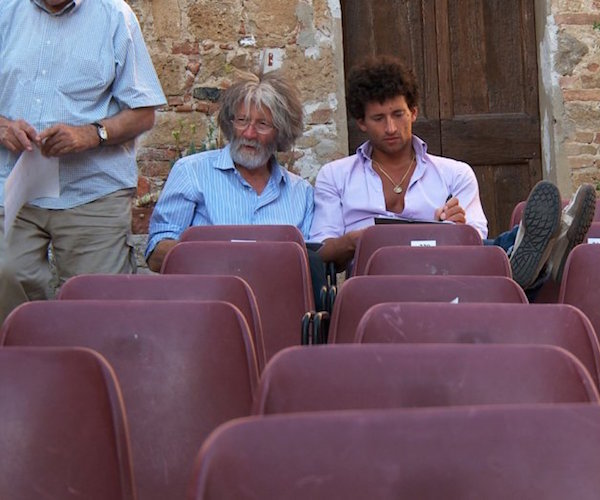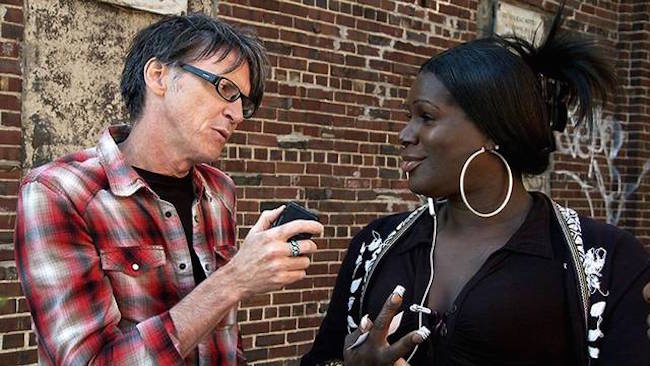Film Review “Spettacolo” and “One October” at the IFFBoston
From the homogeneous small town of Spettacolo, we travel to One October‘s ethnic gumbo of eight million in New York City.
Spettacolo – Directed by Jeff Malmberg and Chris Shellen. At the Somerville Theatre on Saturday, April 29 at 3:30 p.m. as part of the Independent Film Festival Boston.
One October – Directed by Rachel Shuman. At the Somerville Theatre on Sunday, April 30 at 12:45 p.m. as part of the Independent Film Festival Boston.

A scene from “Spettacolo.”
By Betsy Sherman
One documentary takes us to an exotic place. The other is in a familiar place but takes us back to a time that seems otherworldly in retrospect. Spettacolo, by Jeff Malmberg and Chris Shellen, spotlights a tiny town in Tuscany whose inhabitants each summer perform in an original topical show in which the participants play themselves. One October, by Rachel Shuman, follows in the tradition of “city symphony” films as it focuses on the eternal and the ephemeral in New York City. It startles, however, because the October it portrays is 2008, and an “ephemeral” feature is the excitement over the prospect of Barack Obama winning the presidency. Concurrently, it’s a time when the magnitude of the financial collapse is becoming clear.
The place where these two documentaries overlap is Wall Street. That’s because the citizens of Spettacolo‘s Monticchiello (population 136) suffer still from the domino effect of the 2008 crash and from the continued corruption within the worldwide financial community. Filmmakers Malmberg and Shellen—he directed, and she produced, the award-winning documentary Marwencol—first came across the “town that plays itself” on their honeymoon. They spent six months there (with no additional crew) shooting this fascinating film, which is divided into four chapters, one for each season.
A montage of clips gives a feel for past incarnations of the “autodrama.” Elders of the community, their voices full of emotion, tell of the April 1944 showdown between partisans and fascists that nearly led to a massacre of citizens by the Nazis. A post-war recreation of these events in a drama seems to have been the impetus to chuck the usual costumed summer pageants in favor of an event that’s more vibrant and meaningful. If you’re thinking cutesy “let’s put on a show, kids”—uh-uh. The “Teatro Povero” (Poor Theater), as they call it, is sophisticated fare.
The filmmakers rarely venture far from the side of Andrea Cresti, the intrepid and wonderfully photogenic painter who has directed the summer play for decades. The film opens in the winter, when Andrea conducts a brainstorming meeting in which participants will decide what is most resonant in the current moment. From the idea, a script will be built. Consensus settles on pervasive financial insecurity, involving not only the banks but also the Italian government, which is slashing funding. This suggests a theme to be explored: the end of the world.
Monticchiello is becoming a town of old people, and the tradition of community participation in the Teatro Povero is eroding. People, especially young people, are too busy (in addition, we learn of a rift that divided the formerly cohesive populace). The region’s future seems to be in tourism and the construction of vacation homes; the double edge pointed out by Andrea and others of his generation is a loss of soul.
As sobering as all this sounds, the movie is not a downer. There’s so much to admire in the players’ creativity and courage to speak their minds. Although Andrea is fairly stoic, his whimsy comes out in watercolor sketches that depict the thoughts bursting out of people’s heads. The landscape and architecture are beautifully photographed, but more important are the array of faces and the music of the voices. Plus, we learn that the Italian equivalent for “break a leg” is the colorful two-part “In the mouth of the wolf” / “Die, wolf.”
From the homogeneous small town of Spettacolo, we travel to the ethnic gumbo of eight million in New York City. The Italians’ play included a chant aimed at “J.P. Morgan! Lehman Brothers!” and a list of other institutions. One October shows us the crash’s ground zero, where Wall Street bankers and brokers get hassled by protesters and street-theater pranksters (“Happy bail-out!”).

A scene from “One October.”
Not merely observational, the documentary connects to the people of New York by pointing the lens at WMFU radio host Clay Pigeon, a Midwesterner whose Dusty Show features on-the-street interviews. Clay has the moxie to ask invasive questions and the tact to phrase them in a non-threatening way. The film includes a nice cross-section of folks enjoying the autumn outdoors.
As in Spettacolo, income inequality and gentrification are on people’s minds and in the air. The camera is often pointed upwards, not only at familiar skyscrapers but also at new luxury condo complexes being built. A couple whom Clay interviews in a park, when asked about the changes they’ve seen in the city, say it’s “turning into a great big mall” and that there was a shift from “pre-Giuliani” to “post-Giuliani.” A black woman in Harlem offers that she’s scared because rents are shooting up and new residents are “taking over our houses.” Even Clay, when the tables are turned on him by a homeless interviewee, reveals that his future’s not looking good. It raises the question, where are these people now, eight and a half years later?
Much of One October is celebratory, showing New Yorkers singing, dancing, praying, marching in parades and such, with visitors basking in the city’s glow. New York, they say, is a place where you will be accepted. The film shares with Spettacolo a great sensual beauty, but its leap back in time brings up, well, issues. If you’re not happy with the recent turn of events, politically, the sight of wall-to-wall Obama hope ‘n’ change posters can be a lot to bear. It brought up a lot of feelings, and frankly, I found it painful, which may not be valid film criticism, but that was my experience. Although one poster that said “Make America Great Again, Vote Obama” may draw laughs as well as winces.
Betsy Sherman has written about movies, old and new, for The Boston Globe, The Boston Phoenix, and The Improper Bostonian, among others. She holds a degree in archives management from Simmons Graduate School of Library and Information Science. When she grows up, she wants to be Barbara Stanwyck.
Tagged: Chris Shellen, Independent Film Festival Boston, Jeff Malmberg, One October, Rachel Shuman
